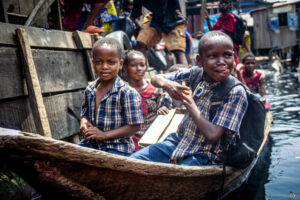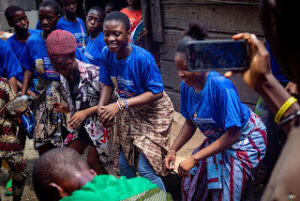Culture of Survival at Makoko
By HOMEf
Survival Stories and strategic discussions are based on how a group of people (community) survives the impacts of climate change, environmental crisis, and government policies that seem to distort their well-being. It tells the narrative of how they (community people) have been able to survive, after the colonization of their resources and region, striving as a people to decolonize their culture and environment. The event was geared towards building community resilience through culture and arts, using cultural tools as this will serve as a means of conveying knowledge from one generation to another.
On the 28th of February 2024, Health of Mother Earth Foundation in collaboration with CEE-HOPE organized a one-day event on Cultural Survival, featuring stories, strategic discussions, and launching of Nnimmo Bassey’s new collection of poems titled of I See the Invisible. The event was held at CEE-HOPE resource centre in Makoko Community, In Yaba Local Government area of Lagos.
The event began with welcome words by Betty Abah – the Director of CEE-HOPE, who thanked HOMEF for their continuous support of the Makoko people stressing that Dr. Nnimmo Bassey has become a household name in Makoko, and that it was a privilege to have him read from his book I See the Invisible.
In his brief remarks, Chief Akintimenyi, a community leader, stressed that the Makoko people have gone through a lot, and the government is fully aware of what is going on in the community, yet they still engage in sand-filling the lagoon at the community.

Survival stories from Makoko
Community Chief Akintimileyin: “There have been multiple attempts by the government and other external bodies to sand-fill Makoko’s frontage.” He linked it to a similar fight ongoing in some riverine communities in Ondo State. “When this happened, HOMEF took it up. They came, listened to us, surveyed the situation, did their research and stood with the community. The fight is currently ongoing, and we will win.”
“Every year, there is a plan to demolish Makoko. Right now, we have nowhere to fish. We have to go to the sea to get our daily bread, and even doing this does not guarantee a great catch.”– Mr Dosumu.
“Makoko people are facing a lot of challenges. They no longer have fish in their lagoon and now struggle to get fish to buy and sell.” – Mrs. Dora (a fish trader) lamented, calling the government to come to their aid.
“We also don’t have electricity, N3500 petrol doesn’t last for two days. The cost of feeding is increasing daily at an alarming rate. Because of cheap rice offered by government as palliatives, some people went to Customs and some of them died.” – Mrs.Titilayo Akintimehin.
Israel Idowu, a member of the community, asked for more opportunities for Makoko Youth to work with HOMEF. He further mentioned that there have been several attempts to divide the community. Lastly, he spoke about floods in Makoko. “The water level is seasonal, and the people know how to prepare for it. What we do to survive is to raise our structures above the water level. Unity amongst the youth has kept the community standing. Every 4 years, the government tries to take over the community, but the youths have been united and stand against that.”
The children of Makoko were not left out, as they were given a platform to tell their stories as well. Flora Anthony, 14 years old, said, “During the rainy season, the environment is flooded. If there’s no boat, we can’t go to school. There are no roads and often, we are late to school.” She also mentioned her parents’ and community’s struggle to pay her fees and provide her and other children with learning materials.
Odunayo Ogunfeyimi, 14 years old, said, “We don’t have a good tap and potable water. The roads are bad and sometimes, we children fall inside the gutters on our way to school.”
Comrade Tobi presented a gift of a basket of fish to Nnimmo Bassey signifying the source of livelihood of the Makoko people. He also led the children in some dance and drumming routines in displays of the rich culture of the people.
Book Reading and Review
Following the survival stories and strategic discussions, the children from Ori-Oke opened the second segment of the event with a special cultural dance performance. They danced to the beat of a bata drum and sang songs extolling their cultural virtues.
Cadmus Atake-Enade, remarked that the dance performance from the children was proof that parents in Makoko were teaching their children the right cultural values.
Evelyn Osagie popularly known as “Evelyn the poet” read 3 poems from the book I See the Invisible. She read Love, I Come From the Future, and We Are the Moon and the Sun. It was a very engaging session with rapturous audience participation.
Two children from Makoko recited a poem each from the Bassey’s book. Folarin Balogun read “I Am Not Afraid” and Olashina Faith read “Scarified and Sacrificed”. Esther, a CEE-HOPE volunteer, read from Betty Abah’s book, “Pipeline Pikins”.
Betty Abah also read her poem Beyond the Storm from the collection “Sound of Broken Chains” published in 2011. She further read Dem Go Say I be Woman from “Go Tell Our King” published in 2012.
Cadmus Atake-Enade read an original poem My Head Full. He also read Swamp Buggies from “I See the Invisible”. He ended with By Me We Spoke – a poem about stolen Benin bronze masks from the collection.
Betty Abah reviewed the book, I See the Invisible. She titled the review, “Amidst a gloomy climate, Environmentalist Bassey Sees the Invisible.” I See the Invisible has 148 pages and 133 poems and was published by Daraja Press, Canada in December 2023. His 7th collection of poetry, Abah named it his best by far.
“It is a known fact that not too many people fancy poetry because of the obscurantist tendencies of most poets but this is a book that would hold you spellbound be you a poetry lover or just a random reader in an impatient world. This is due to the freshness of ideas, the authenticity of the issues, the simple yet creative lines and the sheer melody of the entire presentation in Dr. Bassey’s latest literary offering.”
Abah called the collection “a meditative and creative documentation of the views of an activist, a non-violent and sometimes angry yet subdued commentator on the violent crushing of the environment and the equally crushing effects on its people’s lives and livelihoods-from the Niger Delta to the far-flung regions of the world where mineral resources have become a harbinger of death and destruction.”
She highlighted some poems in the book and the significance they held for the reader. Highlighted poems included, “Scarified and Sacrificed”, “Twilight”, “Schooled by Nature”, “The Womb of the Earth” and the title poem.
“Yet the most poignant poem in the collection is equally the title poem, ‘I See The Invisible’. In so many ways, both the poetry book and the poet himself embody hope for a desecrated land. Not only is he a voice crying in the wilderness… he is also a voice for hope symbolising the fact that the oppressors cannot get perennially away without being questioned and brought to book by the sons and daughters of the land with the help of books such as this and community engagements such as the one we are holding today.”
Her final words were, “There is no faulting this attractive book in any way. It is an excellent production, as excellent as the mind behind it.”
Nnimmo Bassey then addressed the participants, expressing his joy in seeing everyone present, especially the children. He mentioned in no uncertain terms that he was happy the event was taking place in Makoko and that Makoko was the first public reading of I See the Invisible in Nigeria.
“Makoko,” he said, “is very close to our hearts and we consider ourselves close to this community. This community represents the challenges of Nigeria. Despite the pressures, you have remained resilient. You always stand up for what is right. You stand for justice and have never allowed the system to overwhelm you. You have also shown how communities adapt to climate change.”
Opening the book, he read Becoming Clearer, Holding My Peace, and I See the Invisible.
“Makoko is important for many reasons. It shows how a community can be resilient and stand strong. For Nigerians to tackle climate change, we need to pay attention to Makoko and what is happening here. Makoko shows how Nigerians can love one another and build a strong community in the face of relentless oppression. Makoko is resilient because the people of Makoko love the location, the land and themselves. Makoko still stands because the people who matter in the community live in the community. Makoko is proof that when we stand together, we can resist all external forces. When we see the children of Makoko, we see hope. Not only for Makoko but for Nigeria.”
Afterwards, he read an adapted poem. The poem “We Thought It Was Fish, But It Was Blood” is an adaptation of his critically acclaimed poem, “We Thought It Was Oil, But It Was Blood.”
After his rendition, Idowu Esuku, a climate musical activist, took to the stage and performed an original rap song titled “Loss and Damage”.
In closing, Betty Abah talked about how Nnimmo Bassey’s work inspired her to start CEE-HOPE. She also expounded on his work with community members in remote areas across the country.
“When Nnimmo Bassey came to Makoko in 2014, he said the only thing that can elevate this community was if the children are educated. Today, he’s helping to build a school in Makoko. It’s one thing to talk about the situation and another thing to empower the people in the situation.”
Evelyn Osagie briefly spoke about the mentorship she received years ago from Nnimmo Bassey. She charged parents in Makoko to be active and teach their kids well because these interactions will go a long way for them.
The event came to a close with a tour of the fish market and the general Makoko Community.






